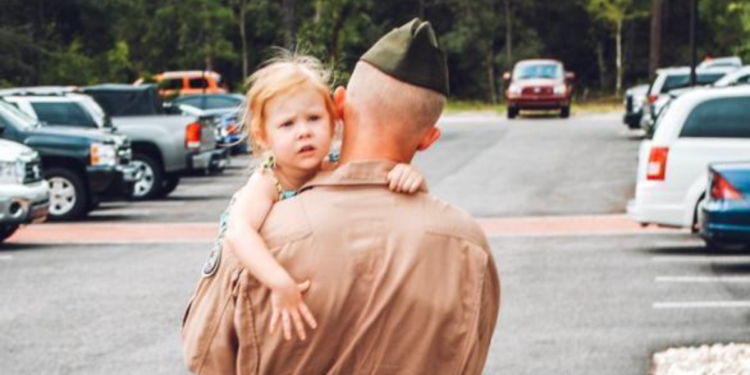From milspousemama.com

Independent, strong, resilient, respectful: these are just some terms used to describe America’s military brats. Over 1.2 million children in the United States currently live in an active duty military home. Of those 1.2 million, 900,000 will have experienced at least one deployed parent. To honor their commitment and sacrifice, April has been designated as the Month of the Military Child. So, what is it really like to be the child of a service member?

I was born and raised in the same home my entire life. My mom still lives there and has since the 70s. My best friends from Kindergarten were in my wedding, and my hometown was all I ever knew until college. But that’s not the case for my husband., Jesse. Born to an Air force pilot, Jesse moved around quite a bit as a child: New Mexico, California, Missouri, Florida and even overseas to Japan and Germany. His father would be gone, often. Even an entire year as he received unaccompanied orders to Iceland. But, like most children in any household, it’s all Jesse knew. Dad was leaving again. “See you later.”

He made friends, only having to part from them later. Sometimes they would remain friends for a couple of years-sometimes only a few months. As a result of his having to make new friends so often, he was forced out of his comfort zone. He was compelled to have an outgoing personality and a sense of humor, so that he easier fit into new schools and new cliques. These social skills that were developed at a young age not only helped him make friends quickly, but also stave off bullying . After spending most of his childhood changing schools, he was finally able grow roots in high school and become the extrovert he was intended to be.

During college, Jesse was enrolled in ROTC, where he received training for his future as a fighter pilot in the United States Marine Corps. Now, not only is he a fighter pilot, but he is raising two military brats of his own.
Currently, our family is stationed overseas on a base of 5,000 with children everywhere. We have two elementary schools, a middle school, and high school all within walking distance. We feel so blessed that our children are growing up around other military children, and Jesse plans to use his own nostalgic feelings to help our children grow and adapt in this unique lifestyle in which we live.

Is it easy? No. Are there challenges that are unique to military children? Definitely. My two year old often cries for Daddy when he’s deployed. The answer’s always the same: Daddy’s at work. I give my son his “Daddy Doll”, and he seems to accept that for the time being. Our children are 10,000 miles away from their grandparents, some whom we haven’t seen in almost two years.

I watch my best friends’ children (back home in the U.S.) go to the same birthday parties and have play dates, yet my children don’t even know who they are. We don’t always tell our children when Daddy (or Mommy) will be coming home because oftentimes, the return dates get pushed back, and we can’t bear to see another look of disappointment.

But it isn’t all doom and gloom. Our children are happy, really happy. With friends who are living the same lifestyle surround them. Children quickly learn the popular acronyms (PCS, USO, OCONUS, DOD, etc.) They are able to travel and have experiences that many people do not have in a lifetime. In the last two years alone, our children have visited seven countries over three continents and have been exposed to various cultures that I hope influence them as they mature and become adults.

But possibly one of the most important traits of these military brats is they learn to have pride in their country even at a young age. On our base, the National Anthem plays at 0800 every morning. Everyone stops what they are doing and stands in respect, including children. They have been taught the importance of this act, and is a truly beautiful site to see children playing in the yard or riding the bike stop to honor their country.

Military children will become independent because they have to be. They often have only one parent at a time to rely on, and they quickly learn to help out around the house. They become strong because although relocation moves are never easy, they begin to learn to accept them and to cope. They are resilient because Mommy or Daddy may deploy for several months, and they know to just keep moving forward. And finally, these “military brats” are some of the most respectful children you will ever know. Of course, when your dad is a drill sergeant, there’s not a whole lot of leniency.





